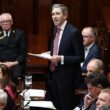With much fanfare, the government recently announced that it had got “permission” from their EU and IMF masters to reverse the cut in the minimum wage institued by the previous government. Fine Gael declared that the decision showed the government was “committed to protecting lower paid workers” while Labour TD Derek Nolan said it showed that “Labour’s decision to enter government has made a real difference in people’s lives”.
The minimum wage is to be restored to €8.65, still a poverty wage. Though this will be welcomed by workers on the minimum wage, it is ironic that it was announced at the same time as a review of the JLC/REA rates, which affect 240,000 workers.
So, how did the government achieve this special dispensation from the EU/IMF? The “quid pro quo”, as Michael Noonan put it, was that the government agreed to “make up” for the loss to the bosses by cutting Employers’ PRSI for minimum wage workers, already one of the lowest in the EU. This will provide an incentive for employers who are hiring staff for just above the minimum wage to cut their pay down to minimum wage levels and save on PRSI costs.
It will also cost the exchequer €369 million a year. Of course, its been agreed with the EU and IMF that all government initiative in relation to jobs or anything else, have to be “revenue neutral” i.e. any tax cuts or spending will have to be made up elsewhere.
So, we’re looking at another €400 million in cuts in other areas in order to pay for a giveaway to low wage employers. The brunt of these cuts will almost certainly be felt by the low paid and the poor.
It is clear that despite the attempts to talk up this change, Fine Gael and Labour are continuing the previous government’s policy of foisting the burden of the economic crisis on workers and the poor.












